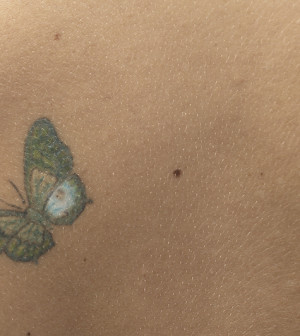- Big Health Care Disparities Persist Across the U.S., New Report Finds
- Teens Often Bullied Online About Their Weight: Study
- Work That Challenges Your Brain Helps You Stay Sharp With Age
- Urine Test Might Spot Head-and-Neck Cancers Early
- Many Seniors Are Overmedicated, But ChatGPT Might Prevent That
- Antipsychotics May Do Great Harm to People With Dementia: Report
- Two-Drug Combo Curbs Drinking for People Battling Severe Alcoholism
- Most Homeless Americans Are Battling Mental Illness
- FDA Recalls Heart Failure Devices Linked to Injuries and Deaths
- COVID Does Not Spur Asthma in Kids, Study Finds
Docs Rarely Discuss Sunscreens With Patients, Study Finds


WEDNESDAY, Sept. 4Even if you’ve suffered skin cancer in the past, it’s unlikely your doctor will mention sunscreen during the average office visit, a new study finds.
A team led by Dr. Kristie Akamine of Wake Forest School of Medicine looked over national data compiled at doctors’ offices from 1989 through 2010.
Overall, doctors mentioned sunscreen to their patients at about 12.8 million office visits — just 0.07 percent of all appointments recorded.
That rate increased a bit, to 0.9 percent, when the office visit involved the diagnosis of a skin condition, according to the study, which was published Sept. 4 in the journal JAMA Dermatology.
Sunscreen use was mentioned least frequently to children.
“[That finding] is concerning because children and adolescents get the most sun exposure of any age group, as they tend to spend much of their time playing outdoors,” Akamine’s team wrote. “Up to 80 percent of sun damage is thought to occur before age 21, and sunburns in childhood greatly increase the risk for future melanoma.”
Two experts agreed that doctors should make time to encourage sun safety.
“With the increasing numbers of topics primary-care physicians may have to cover during an average office visit, it’s not surprising that mentioning sunscreen application may fall to the bottom of the list,” said Dr. Doris Day, a dermatologist at Lenox Hill Hospital in New York City.
“However, we now know that all wavelengths of ultraviolet radiation, both UVA and UVB, are known carcinogens,” she said. “Our best measure against skin cancer and premature aging of the skin is to use sunscreen on a daily basis and to reapply every few hours when out for extended periods.”
Dr. Patricia Mucci LoRusso is a team leader on the Melanoma Dream Team at the Karmanos Cancer Institute in Detroit. She said reducing your exposure to UV rays is “the only recognized modifiable risk factor for melanoma.”
She called the low rate of sunscreen advisories by doctors “dismal,” and said the research highlights that “health care providers play a large role in preventive education regarding melanoma.”
More information
The U.S. National Institutes of Health provides more information on sunscreen.
Source: HealthDay
Copyright © 2024 HealthDay. All rights reserved.










